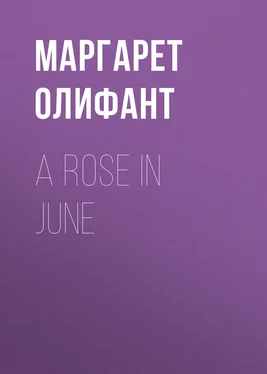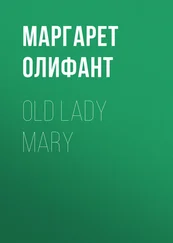Маргарет Олифант - A Rose in June
Здесь есть возможность читать онлайн «Маргарет Олифант - A Rose in June» — ознакомительный отрывок электронной книги совершенно бесплатно, а после прочтения отрывка купить полную версию. В некоторых случаях можно слушать аудио, скачать через торрент в формате fb2 и присутствует краткое содержание. Жанр: foreign_prose, literature_19, foreign_antique, на английском языке. Описание произведения, (предисловие) а так же отзывы посетителей доступны на портале библиотеки ЛибКат.
- Название:A Rose in June
- Автор:
- Жанр:
- Год:неизвестен
- ISBN:нет данных
- Рейтинг книги:4 / 5. Голосов: 1
-
Избранное:Добавить в избранное
- Отзывы:
-
Ваша оценка:
- 80
- 1
- 2
- 3
- 4
- 5
A Rose in June: краткое содержание, описание и аннотация
Предлагаем к чтению аннотацию, описание, краткое содержание или предисловие (зависит от того, что написал сам автор книги «A Rose in June»). Если вы не нашли необходимую информацию о книге — напишите в комментариях, мы постараемся отыскать её.
A Rose in June — читать онлайн ознакомительный отрывок
Ниже представлен текст книги, разбитый по страницам. Система сохранения места последней прочитанной страницы, позволяет с удобством читать онлайн бесплатно книгу «A Rose in June», без необходимости каждый раз заново искать на чём Вы остановились. Поставьте закладку, и сможете в любой момент перейти на страницу, на которой закончили чтение.
Интервал:
Закладка:
But as she looked at this model of man, his words somehow struck and vibrated upon a new chord in the girl’s mind. “The struggle and wear and tear that life demands.” Did Mr. Damerel have much of that “outside,” as he said? He resumed his reading, but his daughter did not look again at the book of poetry which lay open on her knee. Somehow a reflection of the pucker on her mother’s brow had got into her heart—her mother, whom Rose loved, but who was not an idol and model of excellence, like the gentle and graceful being at her side. The contrast struck her for perhaps the first time in her life. What was the meaning of it? Was it because Mrs. Damerel did not understand the beauty of repose, or because a woman’s business in this world is more detailed and engrossing than a man’s? “Fancy mamma spending the whole morning out of doors reading poetry!” Rose said to herself, with an involuntary silent laugh over the absurdity of the notion. No doubt it was because of the difference between man and woman; one of those disabilities which people talked about; and perhaps (Rose went on philosophizing) women are wrong to absorb themselves in this way in the management of their houses, and ought to rule their domestic affairs with a lighter hand, not interfering with all the little minutiæ, and making slaves of themselves. She looked towards the house as she mused, and the vague compunction which had been in her mind sharpened into something like a prick of conscience. It was delightful being out here in the soft shade of the lime-trees, watching when she liked the flitting shadows over the plain below, and the gleam of the river here and there among the trees—reading when she liked “Balaustion’s Adventure,” which was the book on her knee. The significance of the old story embedded in that book did not for the moment strike her. I think she was, on the whole, rather annoyed with Mr. Browning for having brought down the story of a woman’s sacrifice, all for love, into the region of even poetic reason. To Rose, at that period of her development, it seemed the most ideal climax of life to die for the man she loved. What could be more beautiful, more satisfactory? Such an ending would reconcile one, she thought, to any suffering; it gave her heart a thrill of high sensation indescribable in words. How sweet the air was, how lovely all the lights! Rose was just enough of an artist to be able to talk about “the lights” with some faint understanding of what she meant. She was in a kind of soft Elysium, penetrated by the thousand sensations of the morning, the quiet, the flattering soft air that caressed her, the poetry, the society, the beauty all around. But then there came that sharp little prick of conscience. Perhaps she ought to go in and offer the help her mother wanted. Rose did not jump up to do this, as she would have done at once (she felt sure) had she been required to die, like Iphigenia, for her country, or, like Alcestis, for her husband. The smaller sacrifice somehow was less easy; but it disturbed her a little in the perfection of her gentle enjoyment, and dictated a few restless movements which caught her father’s eye. He turned and looked at her, asking fretfully, with a look, what was the matter, for he did not like to be disturbed.
“Perhaps,” said Rose, inquiringly, and appealing to him with another look, “I ought to go in and see what is wanted. Perhaps I could be of some use to mamma.”
Mr. Damerel smiled. “Use?” he said. “Has your mother bitten you with her passion for use? You are not of the useful kind, take my word for it; and make yourself happy, like your namesakes, who toil not, neither do they spin.”
“But perhaps”—said Rose softly to herself—her father gave her a friendly little nod and returned to his book—and she had to solve her problem without his assistance. She tried to do it, sitting on the grass, and it was a long and rather troublesome process. It would have been much more easily and briefly settled, had she gone into the school-room; but then I am afraid Rose did not wish it to be solved that way.
CHAPTER II
Mrs. Damerel went back into the house with a countenance much less placid than that of her husband. I scarcely know why it is that the contrast of perfect repose and enjoyment with anxiety, work, and care should irritate the worker as it invariably does; but here indeed there was reason enough; for Mrs. Damerel felt that the two people luxuriating in total absence of care on this delightful morning ought to have taken a considerable share with her in her labors and lightened the burden she was now obliged to bear alone. This mingled a sharpness of feeling with her toils. People who interpret human nature coarsely—and they are, perhaps, the majority—would have said that Mrs. Damerel was jealous of her husband’s preference for Rose’s society, and this would have been a total and vulgar mistake; but she had in her mind a feeling which it is difficult to explain, which for the moment made her irritation with Rose more strong than her irritation with Rose’s father. He was, in the first place, a man—grand distinction, half contemptuous, half respectful, with which women of Mrs. Damerel’s age (I don’t say young women often do it, at least consciously—except in the case of their fathers and brothers) account for and make up their minds to so many things. I am not attempting to account for this sentiment, which is so similar to that with which men in their turn regard women; I only acknowledge its existence. He was a man, brought up as all men are (I still quote Mrs. Damerel’s thoughts, to which she seldom or never gave expression), to think of themselves first, and expect everything to give in to them. But Rose had none of these privileges. What her mother as a woman had to take upon her, Rose had an equal right to take too. Mrs. Damerel herself could not forget, though everybody else did, that she had been a Rose too, in her proper person; the time even since that miraculous period was not so far off to her as to the others; but before she was Rose’s age she had been married, and had already become, to some extent, Mr. Damerel’s shield and buckler against the world and its annoyances. And here was Rose growing up as if she, instead of being a woman as nature made her, was herself one of the privileged class, to whom women are the ministers. This annoyed Mrs. Damerel more, perhaps, than the facts justified; it gave her a sense of injured virtue as well as feeling. It would be the ruin of the girl—it was wrong to let her get into such ways. The mother was angry, which is always painful and aggravates everything. She was too proud to struggle with her daughter, or to exact help which was not freely given; for Rose was no longer a child to be sent hither and thither and directed what to do. And Mrs. Damerel was no more perfect than Rose was—she had her own difficulties of temper like other people. This was one of them—that she drew back within herself when she felt her appeal refused or even left without response. She went in with a little scorn, a little pride, a good deal of anger and more of mortification. “I must do everything myself, it appears,” she said, with a swelling of the heart which was very natural, I think. After the sun on the lawn, it was very warm in-doors and the school-room was very noisy indeed by the time she had got rid of the applicants in the hall, one of whom (most respectful and indeed obsequious, and perfectly willing to accept her excuses, but yet a dun notwithstanding) had come to say that he had many heavy payments to make up, etc.—and if Mrs. Damerel could oblige him—Mrs. Damerel could not oblige him, but he was very civil and full of apologies for troubling her.
I do not, by any means, intend to say that the rector’s wife was tortured by perpetual struggling with her creditors. It was not so bad as that. The difficulty was rather to keep going, to be not too much in debt to any one, to pay soon enough to preserve her credit, and yet get as long a day as possible. Mrs. Damerel had come by long practice to have the finest intuition in such matters. She knew exactly how long a tailor or a wine merchant would wait for his money without acerbation of temper, and would seize that crowning moment to have him paid by hook or by crook. But by thus making a fine art of her bills, she added infinitely to her mental burdens—for a woman must never forget anything or neglect anything when she holds her tradespeople so very delicately in hand.
Читать дальшеИнтервал:
Закладка:
Похожие книги на «A Rose in June»
Представляем Вашему вниманию похожие книги на «A Rose in June» списком для выбора. Мы отобрали схожую по названию и смыслу литературу в надежде предоставить читателям больше вариантов отыскать новые, интересные, ещё непрочитанные произведения.
Обсуждение, отзывы о книге «A Rose in June» и просто собственные мнения читателей. Оставьте ваши комментарии, напишите, что Вы думаете о произведении, его смысле или главных героях. Укажите что конкретно понравилось, а что нет, и почему Вы так считаете.












